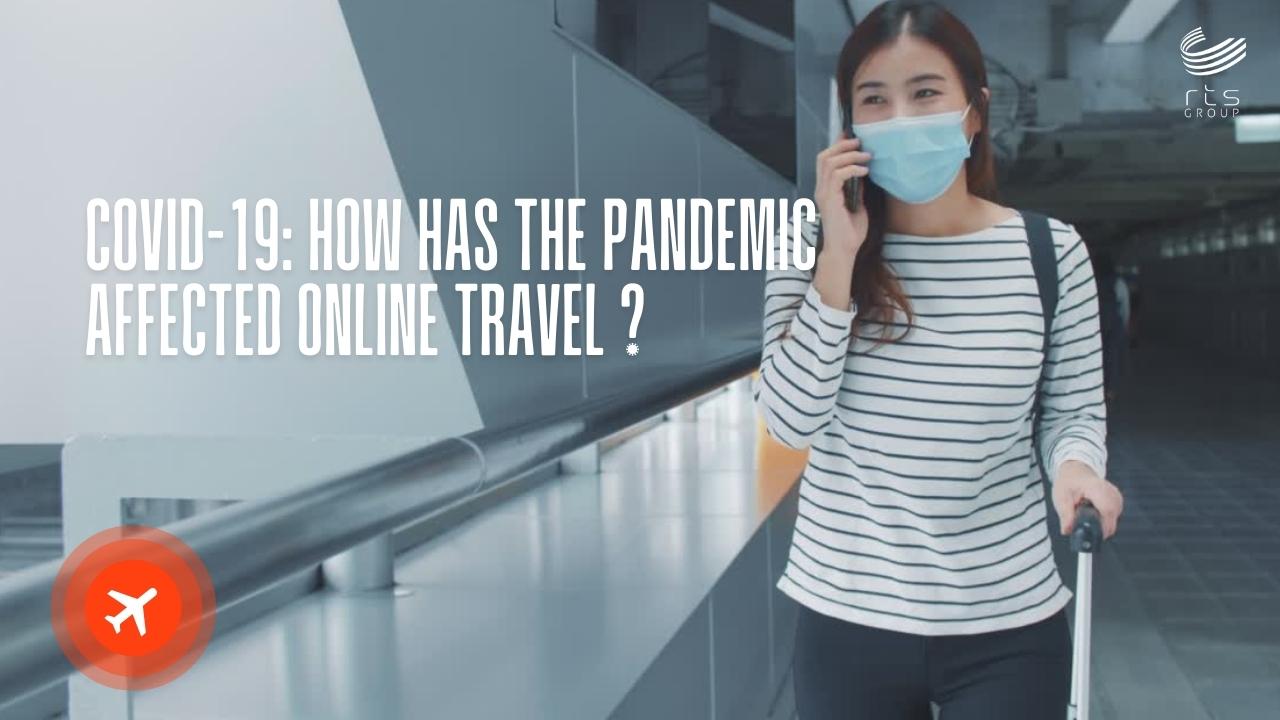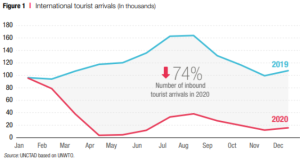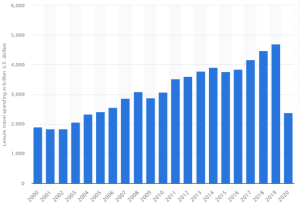
COVID-19: How has the pandemic affected online travel?
Since the onset of the COVID-19 pandemic, travel trend data has shown a sharp uptick in online travel booking behavior. However, the pandemic has had different impacts on both leisure and business travel. Sales of travel websites around the world have declined significantly. During the COVID-19 pandemic, According to UNWTO, almost every country has implemented travel restrictions of one sort or another, including travel bans, visa controls, and quarantines.
Due to this, international tourism was almost totally halted in April and May of 2020. Over 1 billion trips were made by inbound tourists between January and December 2020, a decline of 74 percent. Without including January and February 2020, the decline amounts to 84 percent (UNCTAD, Dec 2020)

https://unctad.org/system/files/official-document/ditcinf2021d3_en_0.pdf
In April 2020 a sharp increase in online travel agents' share of the total travel market, mostly at the expense of airlines' own websites, has been a key trend since the start of 2020. This ongoing trend is likely to continue, particularly until airports start to reopen. The April 2020 issue of Travel and Tourism Dynamics reveals that the pandemic has affected both leisure and business travel.
Leisure Travel
The pandemic has caused many leisure travelers to postpone or cancel their trips, with Europe, Asia, and Australia most heavily impacted. Three quarters of leisure travelers have changed their travel plans as a result of the pandemic. The pandemic has had different impacts on different countries. Leisure and internal tourism were severely damaged by the pandemic, with significant declines of 2.37 trillion US dollars, a spend decreased by 49.4 percent total revenue being lost in 2020

https://www.statista.com/statistics/1093335/leisure-travel-spending-worldwide/
The pandemic has taken a significant toll on tourism. Many leisure travelers, especially from the United States, have postponed or canceled their trips. Europe, Asia, and Australia were most heavily impacted. The pandemic has severely affected the economies of many countries. The leisure sector was particularly hard hit, and many countries, including the United States, Germany, Spain, France, Italy, and Thailand introduced travel restrictions.
The leisure travel industry has been one of the hardest-hit industries, with hotels, airlines, and travel agencies reporting high business disruption.
The industry is expected to recover gradually as travel restrictions are gradually lifted. “The pandemic is causing uncertainty and anxiety across the travel industry,” said David Solomito, executive vice president and head of thought leadership for MMGY Global. “As we move into 2022, the traveler mindset is likely to shift from precaution to optimism, and travelers will be eager to take advantage of fewer crowds and explore new destinations.” However, it will take a couple of years before the travel industry returns to pre-pandemic levels.
Business Travel
The pandemic has had a significant impact on business travel, with 60% of organizations reporting an impact. Companies have reported canceling or postponing conferences, meetings, and business travel. Many companies have implemented new policies intended to mitigate the spread of the virus. Travel bans and emergency meas
ures implemented to deal with the public health emergency turned the tourism industry upside down in 2020. It is for this reason that global business travel spending in 2020 has decreased by 61 percent over its level of the previous year, reaching 504 billion U.S. dollars, whereas it was worth 1.29 trillion U.S. dollars in 2019.
https://www.statista.com/statistics/1093295/business-travel-spending-worldwide/#statisticContainer
The COVID-19 crisis hit all industries hard, but business travel was especially hard-hit. There was a massive reduction in travel spending, which will affect economic growth in 2020," said Michael W. McCormick, president of BCD Travel. According to the results of an annual survey on global business travel spending, business travel spending is expected to rise by 5 percent to 590 billion U.S. dollars in 2021.
Indeed there has been a huge hit on the business travel industry is the COVID-19 outbreak. But on the positive side, it has also opened up new possibilities, allowing for travel management to be managed remotely, adjusting travel policies, and meeting the needs of the business with travel expenditures.
In my opinion, there are many solutions to cope with this epidemic. Starting by building a more resilient tourism economy post COVID-19. Among them are developing plans to encourage a sustainable recovery of tourism, promoting the digital transition and creating a greener tourism system, and rethinking tourism for the future.
On the bright side, companies have adjusted their travel policies and booking behaviors to keep up with the new norm. They came up with new business strategies to keep communicating with guests and implement flexible policies. They should be able to adjust quickly in the future until travel goes back to normal in 2025.
